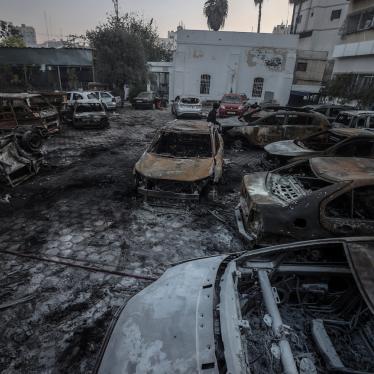The U.S. Congress should vote down the draft military commissions and detainee treatment bill, Human Rights Watch said today. In denying the fundamental right of habeas corpus to detainees held abroad, defining “unlawful enemy combatants” in a dangerously broad manner, and limiting protections against detainee mistreatment, the bill would undermine the rule of law and America’s ability to protect its own citizens from unjust treatment at the hands of other governments.
In its immediate practical impact, the most damaging of the bill’s provisions is clearly its “court-stripping” provision, which would bar detainees in U.S. custody anywhere around the world from challenging the legality of their detention or their treatment via habeas corpus actions, even if they have been subjected to torture. Innocent people could be locked up forever, without ever having the facts of their case reviewed by an independent court.
If held to be constitutional, the court-stripping provision would result in more than 200 pending cases being ejected from the courts, including the case that resulted in the Supreme Court’s landmark detainee ruling in June.
“It’s no secret that the Bush administration deeply resents the court rulings that have recognized basic legal protections that shield detainees from abuse,” said Kenneth Roth, Executive Director of Human Rights Watch. “Congress should reject the administration’s blatant attempt to eviscerate the courts’ role in the U.S. system of checks and balances.”
The right to habeas corpus is one of the oldest and most fundamental of human rights protections. By stripping the courts of habeas jurisdiction over detainees, the U.S. would be signaling to the rest of the world that it is not bound by the rule of law in its treatment of them.
The bill has other dangerous provisions as well. The latest version of the legislation includes an extremely dangerous expansion in the bill’s definition of “unlawful enemy combatant” – a phrase used by the administration to justify holding a combatant outside of the usual protections given to combatants by the Geneva Conventions. It now explicitly deems persons who have “purposefully and materially supported” hostilities against the United States to be combatants, an unprecedented redefinition of “combatant” that could potentially cover a range of innocent people. Financing and support for terrorist activities are already criminal offenses in the civilian justice system. This definition would pervert any reasonable concept of what a combatant is.
“This provision expands the concept of combatant way beyond anything that is traditionally accepted, and it could come back to haunt Americans,” Roth said. “This definition would make every civilian cafeteria worker at a U.S. military base, and every worker in an American uniform factory, someone whom enemy forces could shoot to kill.”
Moreover, the provision also gives carte blanche to the Pentagon to call anyone an “unlawful enemy combatant.” All it requires is that the person be deemed an unlawful combatant by a Combatant Status Review Tribunal (the administrative bodies used at Guantánamo) or “another competent tribunal” established under presidential or military authority.
Another damaging amendment is the bill’s provisions on procedures and rules of evidence for military commissions. Courts-martial proceedings are no longer the starting point for such rules and procedures; instead, the Secretary of Defense is to be delegated the power to create new rules and procedures if he or she considers the use of their courts-martial equivalents to be impracticable.
The legislation rejects the Bush administration’s attempt to explicitly rewrite the humane treatment requirements of the Geneva Conventions and to decriminalize all interrogation practices short of torture. On “Face the Nation,” last Sunday, Senator John McCain made clear that practices such as waterboarding, extreme sleep deprivation and induced hypothermia will continue to be war crimes if the legislation is passed.
The bill does, however, narrow the scope of the War Crimes Act; it bars the Geneva Conventions from being invoked in any suit against the U.S. government, gives the president power to interpret “the meaning and application” of the Geneva Conventions, and prohibits the courts from relying on foreign or international law sources in deciding cases involving certain violations of Common Article 3 of the Geneva Conventions.
The bill’s changes to the War Crimes Act are particularly worrying. While the most abusive of the CIA’s techniques should be prohibited, the administration may try to interpret the draft legislation as allowing other humiliating and degrading practices universally banned by Common Article 3.
Amendments to the draft legislation are due on Wednesday, and it will probably come to the floor for a vote sometime this week.
“The bill effectively rewrites key pieces of the Geneva Conventions and takes away the most fundamental right of detainees to be heard,” said Roth. “It should be rejected as a whole.”
The bill’s court-stripping provisions have drawn critical congressional scrutiny. At Senate hearings on Monday, former diplomats and others underscored the damaging implications of such rules for the treatment of U.S. soldiers who are captured abroad. If the U.S. supports stripping captives of all legal protections, they emphasized, so might other countries.






